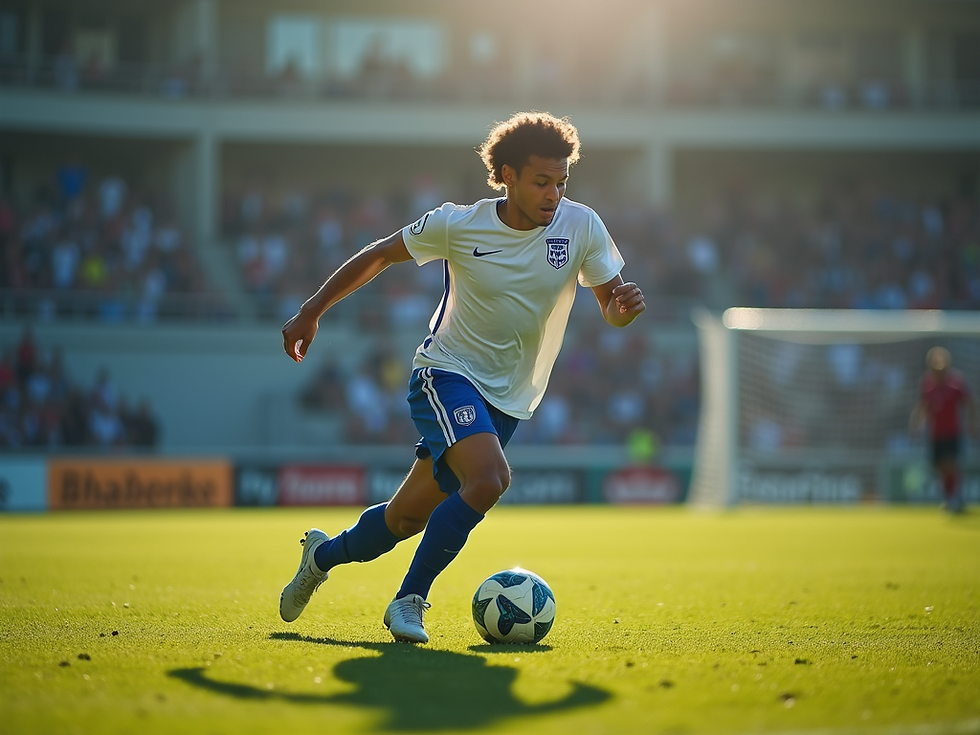Football Mind Games: The Psychological Warfare of Professional Players
- Dr Paul McCarthy

- Aug 7, 2025
- 7 min read

Introduction: The Hidden Battlefield of Football
Football mind games have become an integral part of the modern professional game. Beyond the physical battles on the pitch, an invisible psychological war unfolds that can often determine the outcome of matches more decisively than skill or fitness. From the subtle intimidation between players to the calculated press conference statements from managers, these mental tactics create a fascinating dimension to the world’s most popular sport.
The psychological aspect of football extends far beyond what most fans observe. While spectators focus on tactics and technique, players and managers engage in complex mental strategies designed to gain advantages before a ball is even kicked. Understanding football mind games can give players a significant competitive advantage, which explains why top clubs now employ dedicated sports psychologists as essential members of their staff.
Elite players employ various psychological tactics in football to gain an edge over their opponents. These tactics range from subtle provocations to more overt attempts at disruption. Game theory plays a fundamental role in football psychology, particularly in high-stakes situations like penalty kicks, where players must make strategic decisions based on their understanding of opponents’ tendencies.
“The mental side of football is often what separates good players from great ones,” explains former Manchester United manager Sir Alex Ferguson, a notorious practitioner of psychological warfare. “Technical ability gets you so far, but mental strength takes you to
the top.”
The most effective psychological tactics in football are often subtle and go unnoticed by casual fans. These can include:
Strategic delays during crucial moments
Calculated comments to referees within earshot of opponents
Body language designed to project confidence even when under pressure
Verbal provocations aimed at known emotional triggers
Disruption of opponents’ pre-match routines
Research shows that these tactics can significantly impact performance, with studies indicating that psychological factors can influence decision-making speed by up to 300 milliseconds – a crucial margin in high-speed professional football.
Football Psychology: How Players Prepare Mentally for Big Matches
Modern football psychology incorporates techniques from clinical psychology, performance coaching, and sports science. Top clubs now implement comprehensive mental training programs alongside physical preparation, recognizing that psychological readiness is equally important for performance.
Players who master football psychology often perform better under pressure than those with superior physical skills. This explains why seemingly less talented teams can overcome star-studded opponents in high-pressure situations like cup finals or relegation battles.
Key psychological preparation techniques include:
Visualization exercises - Players mentally rehearse successful performance scenarios
Mindfulness meditation - Techniques to maintain focus and present-moment awareness
Breathing techniques - Methods to control physiological responses to pressure
Team cohesion activities - Exercises that strengthen mental connections between teammates
“It’s so inspiring to see a high-profile footballer be so vulnerable with his emotions,” noted Chelsea defender Ben Chilwell, commenting on Tottenham’s Richarlison opening up about mental health challenges. This growing openness about psychological struggles represents a significant shift in football culture, where mental health was previously taboo.
Studies show visualization can enhance performance by up to 45%, making it one of the most valuable tools in a player’s psychological arsenal. Manchester City’s Kevin De Bruyne has highlighted the disconnect between media portrayals and reality, particularly regarding player personalities and mental struggles, emphasizing how psychological preparation remains largely hidden from public view.

Mind Games in Sports: Why Football Has the Most Intense Mental Battles
While mind games in sports are common across disciplines, football presents unique psychological challenges. The combination of team dynamics, individual responsibilities, and the sport’s global scrutiny creates an environment where psychological warfare flourishes.
The effectiveness of mind games in sports depends largely on the mental resilience of the target. Players with strong psychological foundations can withstand and even turn these tactics to their advantage, while those with vulnerabilities may see their performance deteriorate rapidly.
What makes football’s psychological dimension particularly fascinating is its multi-layered nature:
Player-to-player - Direct confrontations between opponents
Manager-to-manager - Strategic media comments and tactical mind games
Team-to-referee - Collective pressure on officials
Player-to-crowd - Interactions with supporters to build momentum
Internal team dynamics - Psychological hierarchies within squads
Coaches often study mind games in sports from other disciplines to apply new techniques to football. The crossover from sports like boxing (famous for pre-fight psychological warfare) and tennis (known for between-point mental battles) has enriched football’s psychological playbook.
Famous Football Mind Games Examples That Changed Match Outcomes
One of the most famous football mind games examples occurred during the 2006 World Cup final between France and Italy. Marco Materazzi’s verbal provocation of Zinedine Zidane led to the French captain’s infamous headbutt and red card, significantly altering the match’s outcome and providing a textbook case of successful (if unsportsmanlike) psychological warfare.
The Liverpool vs Barcelona Champions League semi-final in 2019 stands as another testament to the power of psychological warfare and momentum in football. Liverpool’s remarkable 4-0 comeback after losing the first leg 3-0 demonstrated how mental strength and crowd energy can overcome tactical advantages. Barcelona players later admitted to psychological collapse under the pressure of Anfield’s atmosphere and Liverpool’s relentless approach.
Historical football mind games examples show how the practice has evolved over decades:
1970s - Mind games primarily involved physical intimidation
1980s-90s - The emergence of referee manipulation tactics
2000s - The rise of media-based psychological warfare
2010s-present - Social media as a new battlefield for psychological tactics
Recent football mind games examples include goalkeepers trying to distract penalty takers with various antics. From Jordan Pickford’s dancing on the goal line to Emiliano Martinez’s notorious distractions during the 2022 World Cup final penalty shootout, these tactics have proven remarkably effective despite their seemingly simplistic nature.
Managerial Mind Games: How Coaches Use Psychology to Win
José Mourinho and Sir Alex Ferguson are considered masters of managerial mind games. Their calculated press conference statements, strategic complaints about referees, and targeted comments about opponents have often created psychological advantages before matches even began.
The Ferguson vs Benitez rivalry during the 2008-09 season provides a classic example of managerial mind games where Ferguson’s psychological tactics led to Benitez’s famous “facts” outburst, widely seen as a turning point in that season’s title race. Liverpool, leading the Premier League at the time, subsequently dropped crucial points as Manchester United overtook them.
Successful managerial mind games can create tension within opposing teams before matches even begin. This disruption of preparation routines and focus can provide a crucial edge in closely contested matches. The media plays a crucial role in amplifying managerial mind games between rival coaches, often unwittingly serving as the delivery mechanism for psychological tactics.
“When I arrived in England, I realized the press conference was not just about giving information to fans,” Mourinho once explained. “It was a tool to communicate with opponents, referees, and sometimes even your own players.”
Effective Psychological Strategies in Football Used by Top Players
Top players develop their own psychological strategies in football to maintain focus during high-pressure situations. These range from personal rituals that create a sense of control to deliberate techniques for maintaining composure when provoked.
Effective psychological strategies in football often involve controlling emotions while disrupting opponents’ concentration. This delicate balance requires significant mental discipline, explaining why psychologically resilient players often enjoy longer careers at the highest level.
Decision-making research with professional players has identified key themes in their psychological approach:
Unpredictability - Keeping opponents guessing about intentions
Option generation - Maintaining awareness of multiple possibilities
Anticipation - Reading psychological cues to predict opponent actions
Game control - Using psychological tactics to dictate match tempo
Teams invest significant resources in developing psychological strategies in football for crucial tournaments. The England national team’s penalty shootout preparation before the 2018 World Cup, which included extensive psychological profiling and mental rehearsal, demonstrates how seriously these aspects are now taken at the highest level.
Developing Mental Toughness in Football Through Psychological Training
Developing mental toughness in football requires consistent psychological training alongside physical preparation. This integrated approach has become standard at top clubs, where mental conditioning is viewed as equally important as tactical and technical development.
Players with exceptional mental toughness in football often become leaders regardless of their position. Their ability to maintain performance standards under pressure makes them valuable beyond their technical contributions, explaining why managers often prioritize psychological profiles in recruitment.
Mental toughness in football is particularly important during penalty shootouts and crucial late-game situations. Research indicates that approximately 85% of penalty success depends on psychological factors rather than technical ability, highlighting why mentally resilient players are often selected for these high-pressure moments.
Former professional player Paul McVeigh’s insights reveal:
Limited active engagement with psychological training in previous eras
The growing importance of visualization techniques
The need for cultural shift in mental training acceptance
“The biggest challenge isn’t teaching psychological techniques,” explains sports psychologist Dr. Emma Ross. “It’s overcoming the stigma that still exists around mental training in football culture. Players often view psychological support as remedial rather than performance-enhancing.”
Conclusion: The Future of Psychological Warfare in Football
As football continues to evolve, the psychological dimension will likely become even more sophisticated. With margins between teams narrowing due to tactical and physical standardization, the mental edge gained through effective psychological warfare may become the decisive factor at the highest levels.
The integration of technology into psychological preparation – from virtual reality training to biofeedback systems that help players control stress responses – represents the next frontier in football mind games. These innovations will provide players with unprecedented tools to both implement and defend against psychological tactics.
For fans, understanding football mind games adds a fascinating layer to match appreciation. Beyond the visible contest of skill and athleticism lies an invisible battle of wills and psychological resilience that often determines outcomes more decisively than what appears on the surface.
As Marcus Rashford aptly stated regarding the mental challenges of elite football: “When I make a mistake, I’ll be the first one to put my hand up.” This accountability and psychological awareness exemplify the mindset required to thrive in a sport where the mental battle is often as important as the physical one.
The history of football mind games dates back decades, with some legendary examples changing the course of important matches. As the sport continues to evolve, so too will the psychological strategies employed by its practitioners, ensuring this fascinating dimension remains an integral part of the beautiful game.



